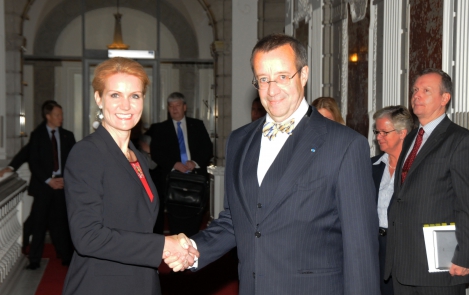-
Reset
+


President Ilves: the European Union must restore internal solidarity and equal treatment
24.10.2011
The President, Toomas Hendrik Ilves, who arrived on a working visit to Denmark, confirmed that today’s system of direct aid is not sustainable in the Common Agricultural Policy of the European Union and distorts competition inside the EU, as the direct aid levels differ by up to six times between the Member States.
“This is far from solidarity and equal treatment, which the European Union should internally rely upon; these principles have been abandoned in the Common Agricultural Policy,” criticised the Estonian Head of State.
“The European Commission’s current proposal to diminish the current differences in the direct aid system is far too modest. This won’t satisfy Estonia,” told President Ilves, who met in Copenhagen with the Prime Minister of Denmark, Helle Thorning-Schmidt, and the Secretary General of the Nordic Council, Halldór Àsgrimsson. “This is particularly so when we consider that Estonia is currently taking part in supporting countries that are wealthier than us, while the same countries are receiving EU agricultural subsidies that are much higher than the subsidies available to us.”
According to President Ilves, economic and financial problems are no longer difficulties that are experienced by a few euro area countries, but they affect the world in general and the only answer to these solutions can be responsible attitude that extends to all countries, compliance with rules and living only – and solely – within our limits.
The Estonian Head of State and the Head of the Danish Government admitted that the current situation in the European Union is a problem for all the 27 European Union Member States, as each and every one of them must remained committed to avoiding the spread of the crisis and must strive to achieve economic growth.
“This is not the time for throwing accusations, searching for excuses or justification; now is time to pull ourselves together and act together in unison,” President Ilves emphasised.
When speaking about the financial framework of the European Union, the Estonian Head of State emphasised the importance of the co-ordinated implementation of cross-border infrastructure projects and in receiving support for them from the EU budget, giving the North-South railway, Rail Baltica, which is to connect Finland and Poland via the Baltic states, as an example.
“This is a project that has links to both the European Union Baltic Sea Strategy and the Nordic-Baltic co-operation,” President Ilves told. “As is the case with the Baltic Sea Strategy, the creation of a common European Union internal market is important for Estonia, as it will significantly contribute to enhancing the competitiveness of both the EU and the region.”
The Estonian Head of State thanked Denmark for its current support to NATO’s air security mission in the Baltic states.
“However, this air security operation, which serves as a good example of “smart defence”, must find a long-term solution, which will extend beyond 2018,” President Ilves emphasised. “It is in the interest of the whole alliance to ensure NATO’s visibility in member states and make everyone believe that NATO is ready to defend itself everywhere in its territory. Estonia wants the required solution to be formalised at the NATO submit in Chicago, in May of next year.”
The Estonian Head of State and the Head of the Danish Government also discussed cyber defence and cyber security, which also requires a commitment from every country to be successful and close international co-operation between allies, as well as professional communication between NATO and the European Union.
President Ilves invited Denmark to join the NATO Centre of Excellence for Co-operative Cyber Defence, which serves as one of the best examples of extensive co-operation in the sphere of cyber defence.
The Estonian Head of State addressed the same topic at an international cyber defence conference, which was organised in 2007 by Danish security and intelligence service (PET), where he created a bridge between the cyber attacks that hit Estonia in 2007 and extensive cyber security.
“Even a primitive attack can create a sufficient number of problems, if we are not sufficiently prepared, regardless of the attacking opportunities that are currently available in cyber space. Credible cyber defence requires co-operation and a change of standard ways of thinking,” President Ilves emphasised.
In Copenhagen, President Ilves also met with former Danish Minister of Foreign Affairs, Uffe Ellemann-Jensen.
Office of the President
Public Relations Department
Phone 631 6229




